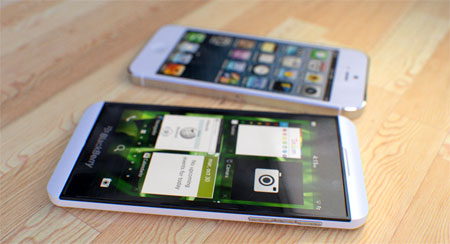
BlackBerry has done a lot right with the Z10, the first smartphone to run its new, bet-the-company operating system.
BlackBerry has done a
lot right with the Z10, the first smartphone to run its new, bet-the-company
operating system.
The touch-screen
phone -- a version with the traditional BlackBerry physical keyboard is
expected, too -- is handsome, intuitive to use and a whiz at multitasking. The
key question, which the market will answer, is whether all that will be enough
to rescue the company after years of mediocre products and corporate
floundering.
At first glance, the
Z10 could be an iPhone 5 clone --same rounded corners, same thin side bezels.
On closer examination, though, differences become apparent. The Z10 has a
slightly bigger screen -- 4.2 inches, versus the iPhone’s 4 inches -- and is a
bit taller, wider and thicker.
It’s also a little
heavier, though by no means uncomfortable. On the front, there’s no physical
button to interrupt the smooth black rectangle; the textured back pops off to
reveal -- thank you, BlackBerry -- a user-replaceable battery, as well as a
MicroSD slot to augment the 16 gigabytes of included storage.
The Z10 goes on sale
first in the United Kingdom, Canada and United Arab Emirates; it isn’t due to show
up in the U.S. until March. The company said all four major U.S. carriers --
Verizon Wireless, AT&T, Sprint and T-Mobile -- will offer it for $199 on a
two-year contract. It will run on the fastest networks, known as LTE, where
available.
The new operating
system, called BlackBerry 10, differs from Apple’s iOS and Google’s Android in
its greater use of finger swipes rather than just taps on icons to move around
the interface.
Universal in-box
The central feature
is the BlackBerry Hub. It’s a universal in-box that encompasses not just your
e-mail accounts but also texts, updates from Facebook and Twitter, messages
from the BlackBerry Messenger service and other sources.
You access the Hub
from within virtually any application by sliding your finger up and to the
right from the bottom of the screen. When you do, the screen you’re on slides
to the right, giving you a peek at the Hub inbox underneath.
If you don’t see a
message you want to interact with, slide your finger to the left and resume
whatever you were doing; if you see something that requires your attention,
keep sliding to the right and the Hub expands to fill the screen.
Best of all, you can
respond from within the Hub app. No need to launch a separate e-mail client, or
Facebook to like or comment on a post, or Twitter to reply to a tweet: The Hub
is one-stop shopping for communications.
Video messenger
The new operating
system also introduces a video-chat feature into BlackBerry Messenger. It’s
similar to Apple’s FaceTime, but it adds the ability to share screens, which
could prove useful in both business and personal use. At launch, the video
feature will be available only over a Wi-Fi connection.
The Z10 is shot
through with nice features. When you’re tapping out a message, multiple
possible words appear on screen; all you have to do is flick the right one into
place with a finger-swipe. Multilingual users may appreciate that the keyboard
dictionary can handle up to three languages simultaneously.
The eight-megapixel
camera includes a feature called TimeShift that lets you adjust individual
components in a photo to assure that, for instance, everyone in a group shot
has their eyes open. And a near-field communications chip gives the Z10 the
same tap-phones-to-share-content ability that Samsung is promoting heavily on
its Galaxy S III.
On the other hand,
the BlackBerry 10 operating system will have many fewer apps available -- about
70,000, the company says -- than iPhone and Android, which number in the
hundreds of thousands.
Battery plunge
BlackBerry says the
Z10 will run a full day in normal use. I couldn’t get a good read on just what
that meant because a bug on my test device caused the battery to discharge when
the phone was idle. The company says it’s a known issue that will be fixed
before the Z10 reaches customers.
I also wasn’t able to
test one of the new operating system’s key features for corporate users, called
BlackBerry Balance, which sets up separate identities for your personal and
work lives.
The idea is that when
your phone is in personal mode, anything goes: You can customize to your
heart’s content, download apps and content from the BlackBerry World store and
basically do what you damn well please. Flip to work mode, though, and your
environment is determined by your company, which can limit what you can
install, even down to the wallpaper.
Safeguards prevent
anything stupid you do on the personal side from affecting the corporate side
-- and, the company assures the paranoid, any of your personal data from being
accessed by your employer.
Features like Balance
suggest that you may be as likely to be handed the Z10 by your company IT
department as to buy it yourself. Either way, you won’t have to wince at the
prospect.

 Previous page
Previous page Back to top
Back to top







